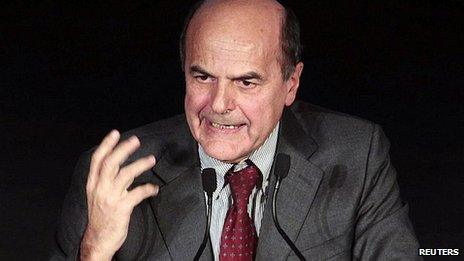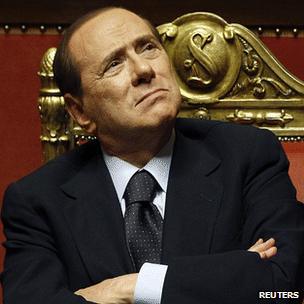Pier Luigi Bersani hopes to lead Italy in new direction
- Published

The newly re-elected leader of Italy's main centre left faction, the Democratic Party, is not exactly cut out for the age of slick and snappy televised politics.
Pier Luigi Bersani is a bald, professorial figure in his 60s who speaks in slow, measured tones.
And as a cigar-smoking former-communist, Mr Bersani has about him an air of the past.
But he may well be about to lead Italy into its political future.
Mr Bersani has just seen off a challenge to his position at the top of the Democratic Party.
And as it is comfortably ahead in the polls, he could emerge as the next prime minister after elections in the spring.
The effort to oust Mr Bersani as party leader came from a very different type of man: the 37-year-old Mayor of Florence Matteo Renzi.
Mr Renzi presented himself as the face of a new generation.
He talked of the need to scrap the entire generation of older politicians who, he said, had failed Italy decade after decade.
Mr Bersani conceded that he and the rest of the party establishment had, at times in the past, disappointed their supporters.
But he argued that he had the experience that Italy will need in its next leader as it struggles to overcome its economic crisis.
And in Sunday's Democratic Party primary, Mr Bersani won easily.
His victory speech was in the straight-talking style that is his trademark.
"We must win, but we can't win at any cost," he said. "We can't win by telling fairy stories... we must take another road.
"It won't be easy, but the country needs it. We will not be able to ignore that we are facing the worst crisis since the war."
However, Mr Bersani has work to do before the elections.
He needs to heal the divisions that the leadership contest has exposed in his party.
And he will have to negotiate potentially tricky alliances with smaller factions if he is to weld together a durable centre-left coalition.
"Bersani has to be very careful," says Professor James Walston, who teaches Italian politics at the American University of Rome.

Silvio Berlusconi is still undecided on whether to lead the PDL into the next election
"Most centre-left supporters realise that they risk splitting up again. It's happened on many occasions.
"There are divisions between modernisers and traditionalists. There is a right-left division. Renzi is seen as more centrist and Bersani as more left."
But Mr Bersani's life is being made easier by the chaos among his opponents on the right of the political spectrum.
Former Prime Minister Silvio Berlusconi has dithered for months over whether or not to lead his bloc, the People of Freedom (PDL), into the election.
And his indecisiveness has created such extreme tensions that the party is on the verge of splitting up.
Mr Berlusconi is now a much diminished political figure.
He was humiliatingly forced from power a year ago as Italy's economic problems worsened.
He remains beset by personal legal problems and his party has been riven by recent financial scandals at provincial level.
All the same, Professor Walston believes the former prime minister may well eventually decide to put himself at the head of the PDL list going into the polls.
"This is a politician who refuses to give up," he says.
"He wants to stay, if not centre stage, then as an important person on the side of the stage."
Five Star Movement
Right now Mr Berlusconi's party is so marginalised that it is actually polling in third place behind a citizens' movement led by the comedian turned political activist, Beppe Grillo.
What is known as the Five Star Movement was born and raised - and sustains itself - on the internet. It has no traditional party structure.
It draws its support from those many Italians who are repelled by the corruption that has so badly blighted the nation's politics.
And it is now possible that after the election the Five Star Movement will form the largest opposition bloc.
But anybody thinking hard about the make-up of that next parliament wonders what role the current, unelected, technocrat Prime Minister Mario Monti may, or may not, play.
There are elements in the political centre ground who would like him to stay on, perhaps heading a cabinet of elected politicians.
Mr Monti says he wants to walk away when his term ends in the spring.
But he also says that if he is called upon to serve in some way after the polls, he would be ready to do so.
And there is one other moving part in the political machinery.
There are demands for radical reform of the election law.
This may or may not come in time for polling day.
But if it does, it could have a significant impact on how well, or badly, the various parties end up faring when the votes are finally counted.
- Published19 April 2013
- Published2 December 2012